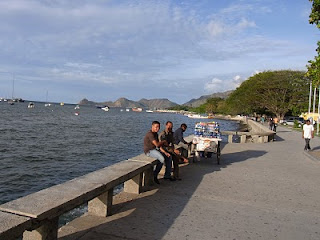
Sightseeing at a small temple in Phnom Penh, I noticed a group of young monks busy studying in a corner. At first I thought it better not to disturb them, but when some of them saw a foreigner they shyly approached me. Instead of reading Khmer books about Buddhism, as I had expected, they were holding photocopies of Headway, a textbook for learning English. I soon found myself helping with their conversation practice. Buddhist temples have always been a place for general education, as well as religious studies, so it is unsurprising that English is on the curriculum for many monks. Most Southeast Asian monks enter temples only for short periods of their lives, so many of them think that English will be useful when they have to look for a job.
However, English is also increasingly connected to the Buddhist religion. More and more books are being published in English on the subjects such as Buddhist doctrine and meditation. Several temples in Burma, Sri Lanka and Thailand offer courses on Buddhism and meditation for foreigners in English.The World Fellowship of Buddhists is based in Bangkok and has a Thai president, but its executive members include Americans, Australians and Malaysians, and its general conferences are in English.

English and Christianity have a long connection in Asia. Of course the religion originated in the western part of Asia, where some of the world’s oldest communities are found. But more Asian Christians, especially in the east of the continent, were influenced by missionaries from America and Europe. Some of them were attracted to the religion through the English language.
Initially, British colonial authorities were reluctant to support Christian missionaries, fearing they might interfere with local power structures. So in India, missionaries went into remote areas that the colonisers knew little about and offered education to people who had been economically and politically isolated. In such places few people had a use for English, so the missionaries were quick to learn local languages and to translate the Bible and prayers into them.

Until the late 19th century Japan resisted missionary activity, but industrialisation brought a new interest in western education and new opportunities for Christians. Sophia University was set up by Jesuits in 1913 and remains one of the leading choices for students who want to study in English. Aoyama Gakuin was established by Methodists in 1949, and in the same year International Christian University was set up after a fundraising campaign by churches in New York. English-speaking students can enter ICU without knowing Japanese, and 7% of its undergraduates are from overseas, the largest numbers coming from the United States and South Korea. Koreans preferring to study at home might attend Yonsei University, an amalgamation of the Presbyterian Jejungwon Hospital, founded in 1885, and Chosun Christian College (1915). It offers many courses in English and is considered one of the country’s top universities.

Some of the most interesting debates about English and religion are in Muslim parts of Asia. Many Muslims remain concerned that English helps to spread non-Islamic values. Education in some Muslim countries emphasises English for scientific and economic advancement but not for cultural and social subjects. In a survey by Saudi linguist Sultan-al-Hamza (1), 82% of students at King Saud University, and 96% of students at Jordan University preferred to study religion, history, literature and education in Arabic, while wanting English for science. On the other hand, Malaysia’s International Islamic University teaches nearly all of its classes in English. As Malaysian linguist Asmah Haji Omar points out, to know English is to have access to a vast store of Islamic literature.



